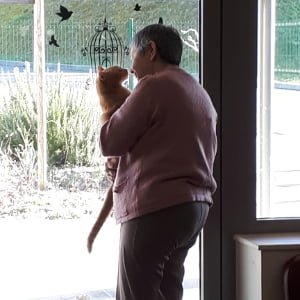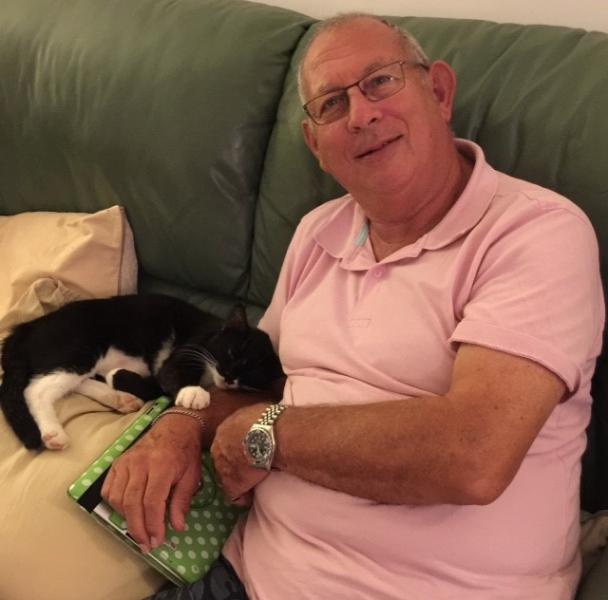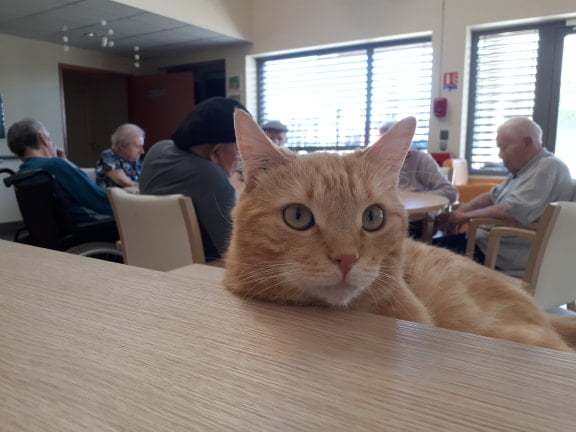
Helping cats to help people
Chats du Quercy tries to create miracles by offering abandoned cats a second chance of a loving family. With the help of a great network, on average, we help more than 500 cats every year.
Projet Thérapattes is our therapy programme, where we place abandoned cats to help the well-being of people in the community.
Every day, we see the positive effects that a pet cat can bring to people who are lonely, depressed, sick or disabled. We see huge benefits and we know that we can make huge improvements to peoples lives.
The idea of Therapattes is to place cats in retirement homes, or in day homes. This would be a stimulating aid for people suffering especially from Alzheimer’s disease, or simply from depression or even children or disabled people.
As people age, they can sometimes become withdrawn and lonely, losing the ability and willingness to develop new relationships. Not only do animals offer companionship, but they can increase the quantity and quality of social interactions with their companions.
Therapeutic care
For those who show little communication, they can help regain confidence through the company of cats. The sense of touch is one of the last senses to be affected by people with Alzheimer’s and an animal can therefore be very therapeutic.
Interactivity has shown an improvement in the quality of life of people with depression and has even helped to reduce the social isolation that is often associated with Alzheimer’s disease. Mme. Tomas is the director of the Le Trelfle Bleu establishment in Paris that accepts pets.
There were cats, dogs, birds and rabbits at the Le Trefle Bleu, and the house kept two cats after the death of their owners.
Two cats are the stars

These cats are now two stars who will sleep where they want, the staff of the house then sets up camp in the room they have chosen. During the day, the two animals have two Louis XVI mini-chairs and they are then the stars of the neighbourhood, the children come to see them in the window.
Mrs Tomas points out that these two cats do a lot of good for everyone, retirees and staff alike. For those who ask to come with their pet, the cat will be easier than a dog, which must be taken out several times a day.
It is common for depressed people who do not want to move, that the obligation to shop for pet food quickly goes from being a chore to something they enjoy doing, giving purpose.
In short, the cat heals and we find the idea Therapattes!
Chats du Quercy’s idea is to place cats in homes where the elderly, children, depressed or disabled reside, such as that of the Le Trefle Bleu in Paris, which accepts pets in his retirement home.
The second part of Therapattes is to offer tours for small groups of 3 or 4 people, elderly or disabled or children at our Adoption Centre in Miramont de Quercy.
We know that autistic children get a huge advantage in having access to a cat, children who are otherwise reserved and isolated will read aloud to a cat and gain confidence through this interaction.
Alca, adorable chat de 3 ans, est placé à l’EHPAD de Lauzerte, on a signé le convention le 31 janvier 2020 – notre premier placement !
 A therapeutic cat is a cat placed to help sick people in a medically beneficial way in order to take advantage of human-animal interaction for relaxation and healing purposes.
A therapeutic cat is a cat placed to help sick people in a medically beneficial way in order to take advantage of human-animal interaction for relaxation and healing purposes.
A therapy cat provides affection and comfort to people in nursing homes, nursing homes, schools, hospices, and other care and services facilities for people.
Cats have been shown to help people overcome the loss of a loved one faster, as it is often easier to talk to something that does not respond and cannot judge than to another human being.
A good therapeutic cat must be domesticated, friendly, cuddly, patient, confident, gentle and comfortable in all situations.
Therapeutic cats have been used as companions to help the recovery and well-being of stroke victims, to lower blood pressure, decrease patients’ anxiety, increase sensory stimulation, prevent depression, inspire a ‘goal’, as well as help in juvenile detention centres, children with intellectual disabilities and to help children with language, speech and hearing problems.
Cats play a positive role
Pets have a positive role in the health and morale of older adults. The psychic benefits of the presence of animals in retirement homes for residents are numerous.
- The cat is a loving and faithful companion, even in the face of the irrational Alzheimer’s residents,
- soothes tensions and
- provides well-being and distraction,
- generates a sense of tranquillity,
- dispels boredom,
- Allows non-verbal communication and thus provides moral support and consolation,
- Does not judge accepting people as they are,
- Is a source of valuation, because he has needs that are essential to be met,
- Promotes social contact.
How do I move into a nursing home with an animal?
Being able to move into a retirement home with animals, dogs or cats, is a real improvement for the well-being of residents.
The normal requirement is that the resident and the salaries must be able to take care of the cat’s hygiene and health.
Sadly, sometimes a person with sudden loss of autonomy has to change his lifestyle to settle in an institution and separate himself from a four-legged companion that he can no longer care for.
In addition, many establishments still refuse to accommodate pets. In this case, solutions exist.
What is zootherapy?
Increasingly developed in nursing homes, zootherapy is a non-drug therapeutic activity. It improves the physical and mental health of residents through the mediation of animals.
For example, animals can intervene in group therapies and thus promote social interactions.
Their presence is also beneficial for residents with Alzheimer’s disease, the disabled, sick children. The pet therapy sessions are often an opportunity for the residents of the retirement home to reconnect with their memories in the presence of the cats.
Our cat playground was built with this in mind and is equipped with benches for visitors to enjoy the company of cats, while giving cats much needed human interaction.
If you’d like more information please contact us either by telephone 05 63 94 73 97 or by the dedicated email address – [email protected]





